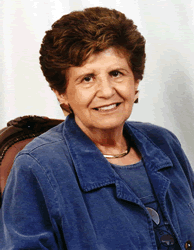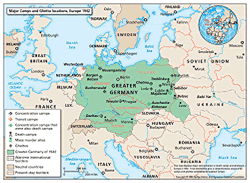The story of Rena (Reina) Finder (nee Ferber)

Current Location:
United States
Birth:
1929
Krakow, Kraków County, Lesser Poland Voivodeship, Poland
Immediate Family:
Daughter of Mozes Ferber and Roza Rozia Windisch
Widow of Marcel (Mark) Finder
Mother of Anita Finder; Marilyn Sandperl and Debbi Katz
https://www.facinghistory.org/resource-library/video/rena-finders-message-young-people
“In this world of bullying and hate crimes, it’s important to teach children not to stand by – you have to go and get help. Don’t stand by and do nothing.”
“You can do so much with what you’ve got. You’ve got an education, a brain, and your heart. You have the power to make changes.”
- Rena Finder, Schindler’s List Survivor
Rena Ferber Finder was born in Krakow, Poland in 1929. She is a Schindler's list survivor who is committed to sharing her story in the hope of keeping the lessons of the Holocaust alive. She is a founding survivor of Facing History and Ourselves and has spoken in classrooms all over the country. For over 43 years, Rena has been an inspiration to thousands of young people struggling to make the right choices in their lives. Rena lives in Massachusetts, where she raised, with her late husband Mark, three daughters: Anita, Marilyn and Debbi. Rena is also the proud grandmother of six and has four great grandchildren.
When the Germans invaded Poland in September, 1939, life as Finder knew it was upended. Nazi troops forced Jews like Finder and her family to move into the ghetto, isolated from the rest of the city. As prejudice, fear, and intolerance began to seep into daily life, it was not uncommon for former neighbors to turn a blind eye to what was happening to their Jewish community members and friends. After Finder’s family relocated, the Gestapo came for her father, taking him away – he never returned. Eventually, the SS evacuated the ghetto, ordering all of its residents to move up the hill to the Plaszow work camp.
For Finder, hope came in the form of Emalia, an enamel kitchenware and ammunition factory owned by the German industrialist Oskar Schindler. Unlike other businessmen, such as the managers of Krupp and I.G. Farben, Schindler did not take advantage of slave labor in the SS camps or mistreat his workers. Instead Schindler, a non-Jew, did everything in his power to provide the Jews that labored in his factory with sufficient food and accommodations. With the help of a relative, Finder and her mother went to work at the factory and for six months had the good fortune of being Schindlerfrauen, women working at Emalia under far more humane conditions than those in other workshops at Plaszow.
In 1944, when Finder was 13, the SS ordered Schindler to shut down Emalia and ordered that the women working there be sent to the Auschwitz-Birkenau concentration camp.
Aware of what would happen if his laborers moved to Auschwitz, Schindler negotiated with the SS and was able to relocate his factory to Brunnlitz, Czechoslovakia. He wrote out a list, which became known as Schindler’s List, with the names of former workers who should be kept off the trains headed to Auschwitz. Finder’s name was on the list and, along with her mother and thousands of other Jews, she traveled to Brunnlitz to work at Schindler’s new plant.
After the Russians liberated Brunnlitz in May, 1945, Finder and her mother went to live in a displaced persons camp. The following year, Finder married, and in 1948 she and her husband, Mark, received visas to move to the United States.

Map of locations of concentration camps, death camps, mass murder sites and ghettos in Europe 1942.
Rena Finder at the 2013 Board Retreat
Play Video
Closed Captioning: Off English
See More Information
Photo Gallery
Rena Finder Photo Gallery
“This is a different year,” Finder said. “Things are happening in this world that we did not expect. For me, this sends me back to 75 years ago, to the war.”
Finder continued by saying that she truly believed another war of the same magnitude would never occur again but that she is now unsure. In the context of contemporary international conflicts, she emphasized how important it is that people, especially younger generations, understand the weight of the past.
She urged students in the audience not to be bystanders, but to face injustices and avoid the detrimental urge to stay silent.
Finder was 10 years old when the Germans invaded Poland. She was an only child and her life was joyous and full of love before the outbreak of the war, she said.
Despite her age, Finder began to recognize changes that followed the German invasion. It was on her school’s playground that she first experienced bigotry—sentiments that grew more apparent as new policies began to target Jewish communities, she remembered.
Finder recalled being astounded by the way neighbors and friends turned against one another, and especially how quickly people turned against her family. She said that Hitler’s new regulations against Jewish people tore apart communities, inciting fear and deception. When the Jewish population in Krakow was forced to move to a ghetto, people threw rocks and jeered at them.
“It seemed like the world went black,” Finder said. “Nobody saw anything. I will never understand how people could believe [Hitler], and yet somehow, millions believed him.”
After her father was arrested and sent away, Finder and her mother were sent to a concentration camp. She faced horrifying levels of dehumanization and was deprived of basic needs such as food, clothing and water, she recalled.
Soon after their arrival, whispers about Schindler, a successful businessman, spread through the camp. He was planning to take 150 concentration camp members to come work for him in a new factory that produced ammunition. Finder and her mother went to work for him, which she described as leaving hell and entering heaven.
Schindler specifically saved Finder in one instance when she was wrongly accused of breaking the machine she was using. He became a figure of bravery and compassion amid the utmost depravity, she said.
“Oskar Schindler was our savior,” Finder said. “He was everything. Our lives were in his hands.”
After some time, Schindler decided to move his factory after hearing of Hitler’s plan to consolidate the majority of concentration camps into one: Auschwitz-Birkenau. He was planning to bring every worker with him to the new factory,.
“How could they think about building a place that made ashes out of human beings? It cannot be explained. And yet, it happened—I was there,” she said.
The dehumanization reached an even more horrifying level. Women’s heads were shaved, leaving them bloody and in pain, and as they moved to the showers, Finder turned to her mother, whom she did not even recognize, and asked if they were dead, wondering if the suffering was finally over. Her mother responded as cold water poured over them.
“‘No, we are not dead,’” Finder recalled her mother saying. “‘We are alive. Touch me, touch me.’”
As Germany began to fall to the Russians, the Germans moved their camps inward, sending thousands into the worst winter of the 20th century to march. Many didn’t survive the journey, but finally, Schindler saved Finder and her mother, along with the other women from the factory, and brought them to his factory for medical care and safety.
“If not for Oskar Schindler, I would not be here. I was able to get married, to have children, to have grandchildren and great grandchildren because one human being would not stand idly by,” she said. “I believe in humanity, in people—that people can be good and work hard to make sure that we have a better world.”
Finder said that by telling her story again and again, people become witness to the horrors of the Holocaust through her. She hopes that the torch of her memory will reach people and inspire them to stand strongly against injustice and hatred, she said.
Willful Ignorance - Erik Larson
Share
Play Video
See More Information
Additional Resources
Download Facing History’s educational guide to accompany the award-winning film Schindler's List.
Share Finder's testimony in your classroom. Her story is included in Facing History’s resource book Elements of Time.
Find out how you can bring the testimonies and voices of Holocaust survivors into your classroom with our Survivor Testimony resource.
For more historical context, explore our Holocaust Resource Collection.

